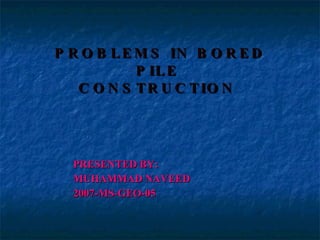Problem in bored pile
- 1. PROBLEMS IN BORED PILE CONSTRUCTION PRESENTED BY: MUHAMMAD NAVEED 2007-MS-GEO-05
- 2. SCOPE 1. EXCAVATION OF PILE BORE 2. DESIGN AND LOWERING OF PILE REINFORCEMENT 3. CONCRETING THE PILE
- 3. TABLE OF CONTENTS EXCAVATION OF PILE BORE 1.1 DRY DRILLING OF PILE BORE 1.2 WET DRILLING OF PILE BORE 1.3 OVERBREAK 1.4 BASE OF BOREHOLE 1.5 EFFECT OF WATER IN BOREHOLES
- 4. 2.DESIGN AND LOWERING OF PILE REINFORCEMENT 2.1 DESIGN OF PILE REINFORCEMENT 2.2 LOWERING OF PILE REINFORCEMENT
- 5. 3. CONCRETING THE PILE BORE 3.1 QUALITY OF CONCRETE 3.2 PLACING OF CONCRETE 3.3 EXTRACTING TEMPORAEY CASING 3.4 PROBLEMS IN SOFT GROUND
- 6. EXCAVATION OF PILE BORE 1.1 DRY DRILLING OF PILE BORE HOLLOW BUCKET TYPE AUGER/CONTINUOUS SUITABLE FOR STIFF TO V. STIFF/MEDIUM DENSE SOIL SUITABLE ONLY WHEN W/T IS DEEP 1.2 WET DRILLING OF PILE BORE BY REVERSE ROTARY METHOD OF DRILLING SUITABLE FOR ANY TYPE & CONSISTENCY OF STRATA SUITABLE FOR ALL W/T DEPTHS
- 7. WET DRILLING BY REVERSE ROTARY
- 8. 1.3 OVERBREAK The formation of cavities outside the nominal diameter of the pile is known as overbreak as shown in Fig.: It may occur in cohesion less soil below W/T Reduces Skin Friction & End Bearing May overcome by using Temporary Casing or drilling under bentonite drilling fluid
- 9. OVER BREAK
- 10. 1.4 BASE OF BOREHOLE To develop the available end bearing it is essential that bottom of borehole is clean and undisturbed. IN CLAYEY SOILS IN SANDY SOILS To avoid the falling of debris, cover the borehole properly before concreting
- 11. 1.5 EFFECT OF W/T In dry drilling of borehole ingress of small quantity of water from sides of the borehole reduces the Skin Friction and from the bottom of borehole reduces the End Bearing. In this condition concreting should be carried out with Tremmie Pipe otherwise segregation of concrete may occur as shown in Fig. SEGREGATION OF CONCRETE
- 12. 2. DESIGN & LOWERING OF PILE REINFORCEMENT 2.1 DESIGN OF PILE REINFORCEMENT The major problem in design of pile reinforcement is its detailing. A minimum spacing of 100mm is required otherwise concrete will not flow outside the cage & proper cover could not be provided. A few large diameter bars are preferred in place of small dia bars This problem is visible during concreting when cage drags downward into the borehole.
- 14. 2.2 LOWERING OF PILE REINFORCEMENT The steel cages should be lowered after providing proper laps so that there will no slippage of cages while lowering. When weight of cages is more in deep piles, cages should be welded at the laps before lowering as shown in Fig.
- 15. LAP OF CAGE
- 16. 3. CONCRETING THE PILE Concreting of cost-in-situ piles is a special operation and it requires considerable skill and correct concrete mix design. 3.1 QUALITY OF CONCRETE Mixes are designed having sufficient workability so that they are self compacting and should not on falling. Slump test in field is adequate to asses the former properties. To achieve above use Rounded Aggregates High Sand Content Plasticizers Super plasticizers should not use because this reduce the setting time of concrete.
- 17. SLUMP TEST
- 18. 3.2 PLACING OF CONCRETE The concrete is placed in boreholes using tremmie pipe to avoid segregation & impinging of concrete on the sides of the borehole. The concreting process should be continuous and completed without any break. The tremmie pipe should be atleast 1.5m embedded in concrete during concreting process otherwise bentonite mixes in concrete and results in the weakness of the pile shaft. If slight delays occur b/w batches then cement slurry comes over surface and causes weakness of the pile shaft. If prolonged delays occur b/w batches then so that concrete has reached their final setting time Overflow of concrete should be sufficient otherwise bentonite remains in concrete which weakens the pile shaft as shown in Fig.
- 20. 3.3 EXTRACTING TEMPORARY CASING After concreting, extraction of temporary casing can create problems particularly if delays occur and partial separation of pile shaft may occur as shown in Fig. This is due to Use of dirty and dented casing. Delay in extracting. Use of poor workable mix.
- 21. CONDUCTOR PIPE
- 22. 3.4 PROBLEMS IN SOFT GROUND In soft ground having undrained shear strength less than 15kn/m 2 causing the squeezing of the pile section near the head because lateral pressure of soil is more than the lateral pressure of concrete as shown in Fig. SQUEEZING OF THE PILE SECTION
- 23. CONCLUSIONS Full time supervision of pile construction should be carried out by an experienced Engineer which gives us the designed pile capacity
- 25. ANY QUESTION?

